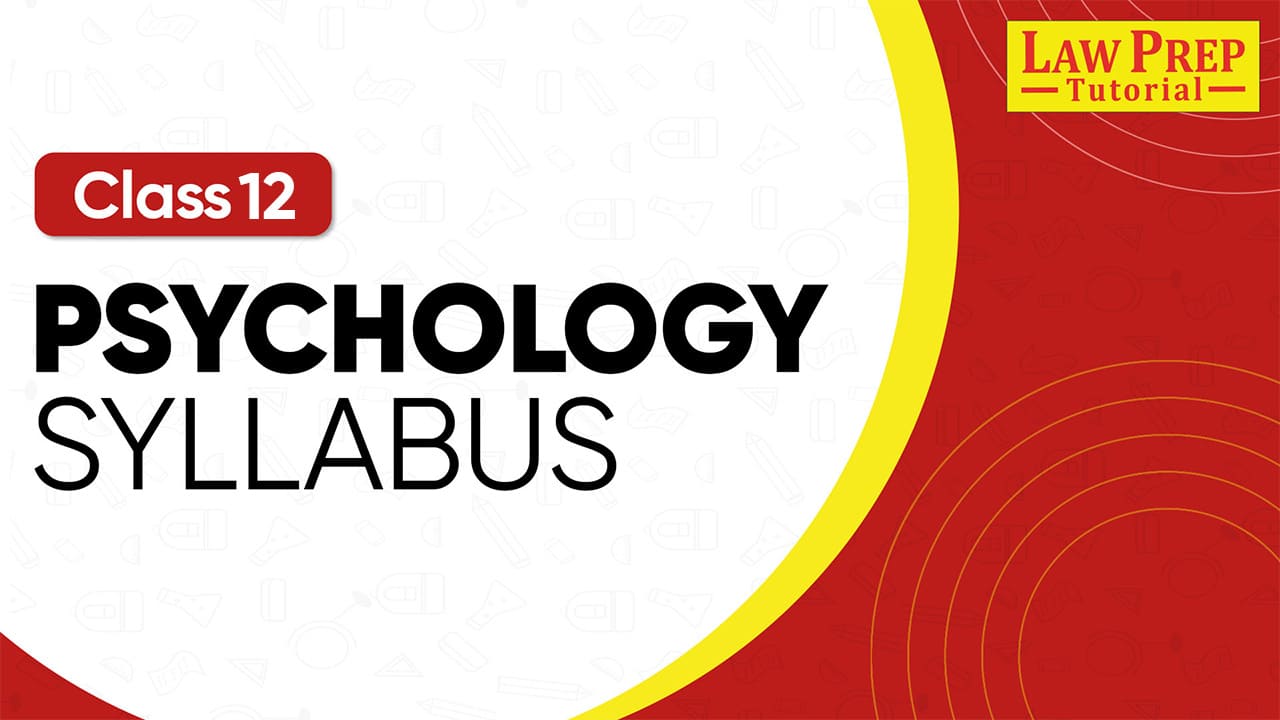The CBSE Class 12 Psychology syllabus 2025-26 is designed to give students a deeper understanding of human thoughts, emotions, and behavior, building upon the foundation laid in Class 11.
It covers important areas such as personality, psychological disorders, therapeutic approaches, social influence, and life challenges. The syllabus of psychology subject for class 12th CBSE not only strengthens theoretical concepts but also emphasizes practical skills through experiments, projects, and case studies.
This balanced structure prepares students for higher education in psychology and related fields like counseling, education, management, and health sciences, while also enriching personal growth and social awareness.
Class 12 Psychology Syllabus 2025-26: Overview
Find the list of chapters in class 12th psychology syllabus:
| Units | Unit Name | Marks |
| I | Variations in Psychological Attributes | 13 |
| II | Self and Personality | 13 |
| III | Meeting Life Challenges | 9 |
| IV | Psychological Disorders | 12 |
| V | Therapeutic Approaches | 9 |
| VI | Attitude and Social Cognition | 8 |
| VII | Social Influence and Group Processes | 6 |
| Total (Theory) | 70 | |
| Practical / Project Work | 30 | |
| Grand Total | 100 |
📥 Download CBSE Class 12 Syllabus PDF!
Download the official Class 12 Psychology Syllabus PDF 2025-26 here.
Class 12th Psychology Syllabus 2025-26
Let’s go through the class 12th syllabus of psychology in detail:
| Unit No. & Name | Topics |
| Unit I: Variations in Psychological Attributes | 1. Introduction 2. Individual Differences in Human Functioning 3. Assessment of Psychological Attributes 4. Intelligence 5. Psychometric Theories of Intelligence (Information Processing, Triarchic, Multiple Intelligences) 6. Individual Differences in Intelligence 7. Culture and Intelligence 8. Emotional Intelligence 9. Special Abilities: Aptitude – Nature & Measurement 10. Creativity |
| Unit II: Self and Personality | 1. Introduction 2. Self and Personality 3. Concept of Self 4. Cognitive and Behavioural Aspects of Self 5. Culture and Self 6. Concept of Personality 7. Major Approaches: Type, Trait, Psychodynamic, Behavioural, Cultural, Humanistic 8. Assessment of Personality: Self-report, Projective Techniques, Behavioural Analysis |
| Unit III: Meeting Life Challenges | 1. Introduction 2. Nature, Types, and Sources of Stress 3. Effects of Stress: Stress & Health, General Adaptation Syndrome, Immune System, Lifestyle 4. Coping with Stress: Stress Management Techniques 5. Promoting Positive Health and Well-being: Life Skills, Positive Health |
| Unit IV: Psychological Disorders | 1. Introduction 2. Concepts of Abnormality & Psychological Disorders (Historical Background) 3. Classification of Disorders 4. Factors Underlying Abnormal Behaviour 5. Major Disorders: Anxiety, OCD, Trauma-related, Somatic Symptom, Dissociative, Depressive, Bipolar, Schizophrenia, Neurodevelopmental, Impulse-control, Feeding & Eating, Substance-related |
| Unit V: Therapeutic Approaches | 1. Nature and Process of Psychotherapy: Therapeutic Relationship 2. Types of Therapies: Behavioural, Cognitive, Humanistic-Existential, Alternative Therapies 3. Factors Contributing to Haling 4. Ethics in Psychotherapy 5. Rehabilitation of the Mentally Ill |
| Unit VI: Attitude and Social Cognition | 1. Introduction 2. Explaining Social Behaviour 3. Nature and Components of Attitudes 4. Attitude Formation, Change, Attitude-Behaviour Relationship 5. Prejudice and Discrimination 6. Strategies for Handling Prejudice |
| Unit VII: Social Influence and Group Processes | 1. Introduction 2. Nature and Formation of Groups 3. Types of Groups 4. Group Influence on Individual Behaviour: Social Loafing, Group Polarisation 5. Conformity, Compliance, and Obedience 6. Cooperation and Competition 7. Leadership 8. Conflict and Resolution Strategies |
More Important Resources for CBSE Exam:
| Class 11th Hornbill Syllabus | CBSE Class 11th Commerce Subjects |
| CBSE Full Form | All about CBSE Class 11th |
| Class 11th Syllabus | Class 12th Syllabus |
| Class 11th Commerce Books | CBSE Board: All details |
CBSE Class 12 Psychology Syllabus: Practical Work (30 Marks)
| Components | Details | Marks |
| Practical File & Case Profile | Preparation of case profile using interviews, observations, and psychological tests. | 10 |
| Viva Voce | Questions based on case profile and two psychological tests. | 5 |
| Two Psychological Tests | Conducting (5 marks) and reporting (10 marks) on tests related to attributes like intelligence, aptitude, attitude, personality, etc. | 15 |
| Total | 30 |
CBSE Class 12 Psychology Syllabus: Question Paper Design
| Typology of Questions | Learning Objectives | Marks | Weightage |
| Remembering & Understanding | Recall, demonstrate understanding of terms, facts, concepts, and principles. | 17 | 24% |
| Applying | Apply psychological concepts, theories, and principles to real-life situations and problem-solving. | 18 | 26% |
| Analysing, Evaluating & Creating | Interpret, analyze, evaluate information, draw inferences, construct arguments, and generate ideas. | 20 | 29% |
| Skill-based/Case-based/Diagram-based | Apply learnt concepts to interpret data, solve case studies, and use diagrams/flowcharts. | 15 | 21% |
| Total | 70 | 100% |
- Time Allowed: 3 Hours
- Maximum Marks (Theory): 70
- Practical Marks: 30
- Grand Total: 100
Prescribed Books for Class 12th Psychology Chapters
Psychology – Class XII, NCERT Publication
This NCERT textbook is the only prescribed book for Class 12 psychology. All board exam questions are framed from it, so students must study it thoroughly.
Objectives of Class 12 Psychology Syllabus 2025-26
- To help students understand human behavior and mental processes in greater depth.
- To make learners aware of how psychological principles apply in everyday life – in family, school, workplace, and society.
- To build critical thinking skills by analyzing, comparing, and evaluating different theories and approaches.
- To develop an understanding of mental health and well-being, and ways to cope with stress and life challenges.
- To provide knowledge about psychological disorders and therapies, promoting empathy and reducing stigma.
- To improve students’ ability to conduct small research studies and psychological tests through practical work.
- To encourage awareness about social influence, attitudes, prejudice, and group behavior in real-world settings.
- To prepare students for higher studies and careers in psychology, counseling, healthcare, education, and related fields.
- To promote self-awareness, emotional intelligence, and personal growth.
- To encourage respect for individual differences, diversity, and cultural perspectives.
Tips to Prepare for Class XII Psychology Syllabus
- Stick to NCERT first: Every board exam question is based on NCERT. Read each line carefully and mark important definitions, examples, and case studies.
- Make short notes: Create mind maps, flowcharts, and tables for processes like intelligence theories, stress, and therapies to make revision faster.
- Practice with real-life examples: Relating concepts like motivation, personality, and stress to your daily life will help you write better answers in exams.
- Focus on diagrams and keywords: Always underline key terms and use flowcharts or diagrams where possible; it improves answer presentation.
- Revise regularly: Instead of last-minute cramming, revise topics in small chunks every day to retain them longer.
- Don’t ignore practicals: Case profiles, psychological tests, and viva carry 30 marks, so practice administering tests and writing reports properly.
- Solve sample papers and PYQs: This helps you understand the exam pattern, marking scheme, and frequently asked questions.
- Discuss in groups: Explaining topics like disorders, therapies, or personality theories to friends strengthens your own understanding.
- Stay updated with examples: Use simple, current examples in answers (like impact of social media on stress or cooperation in team sports).
- Balance theory and application: Learn definitions and concepts, but also practice how to apply them in case studies or problem-solving questions.
Suggested Project Topics for Class 12 Psychology Syllabus
As part of practical work, students need to complete a project or small study. These can be done using surveys, interviews, case studies, or observations. Below are some engaging project ideas:
- Stress and Coping Strategies: Study how students prepare for exams and the methods they use to manage stress.
- Personality Types and Career Choices: Explore the link between personality traits and career preferences among your classmates.
- Social Media Influence on Self-Esteem: Observe how social media usage affects confidence and self-image.
- Peer Pressure in Adolescents: Understand how teenagers are influenced by their friends in academics, fashion, or lifestyle choices.
- Emotional Intelligence and Relationships: Study how emotional intelligence helps in building better friendships and family bonds.
- Gender Stereotypes: Examine how gender roles are still visible in classrooms or families.
- Sleep Habits and Academic Performance: Check whether students who sleep better perform better in exams.
- Attitude Towards Mental Health: Analyze how young people view counseling, therapy, and mental health support.
- Impact of Music on Concentration: Test whether listening to music helps or distracts during study sessions.
- Work-Life Balance in Parents: Study how working parents manage their job responsibilities and family life.
- Altruism and Helping Behaviour: Observe how often students help others and what motivates them.
- Group Dynamics in Classrooms: Explore cooperation, competition, and leadership patterns in group activities.
Check the latest CBSE Class 11 syllabus for all subjects below:
FAQs About Class 12 Psychology Syllabus 2025-26
Theory carries 70 marks, and practical work carries 30 marks, making a total of 100 marks.
There are 7 units in the Class 12 psychology syllabus (theory part).
The official NCERT Psychology textbook for Class XII is prescribed by CBSE.
Yes, with conceptual clarity and practice, psychology can be a scoring subject because questions are direct from NCERT.
Yes, case studies and real-life examples are very important as they help in application-based and long-answer questions.
The unit “Psychological Disorders” carries 12 marks in the board exam.
Yes, it opens doors to careers in psychology, counseling, education, healthcare, social work, and HR.
Units like Psychological Disorders, Self and Personality, and Variations in Psychological Attributes carry higher weightage and are very important.
Read the chapter-wise summaries of Class 11 English here:
Find detailed questions and answers from all chapters of English Class 11 now:
Explore the updated CBSE Class 12 syllabus for all subjects here:
Discover CLAT exam resources that can help you get started early:
Explore CLAT coaching centers across different cities:


